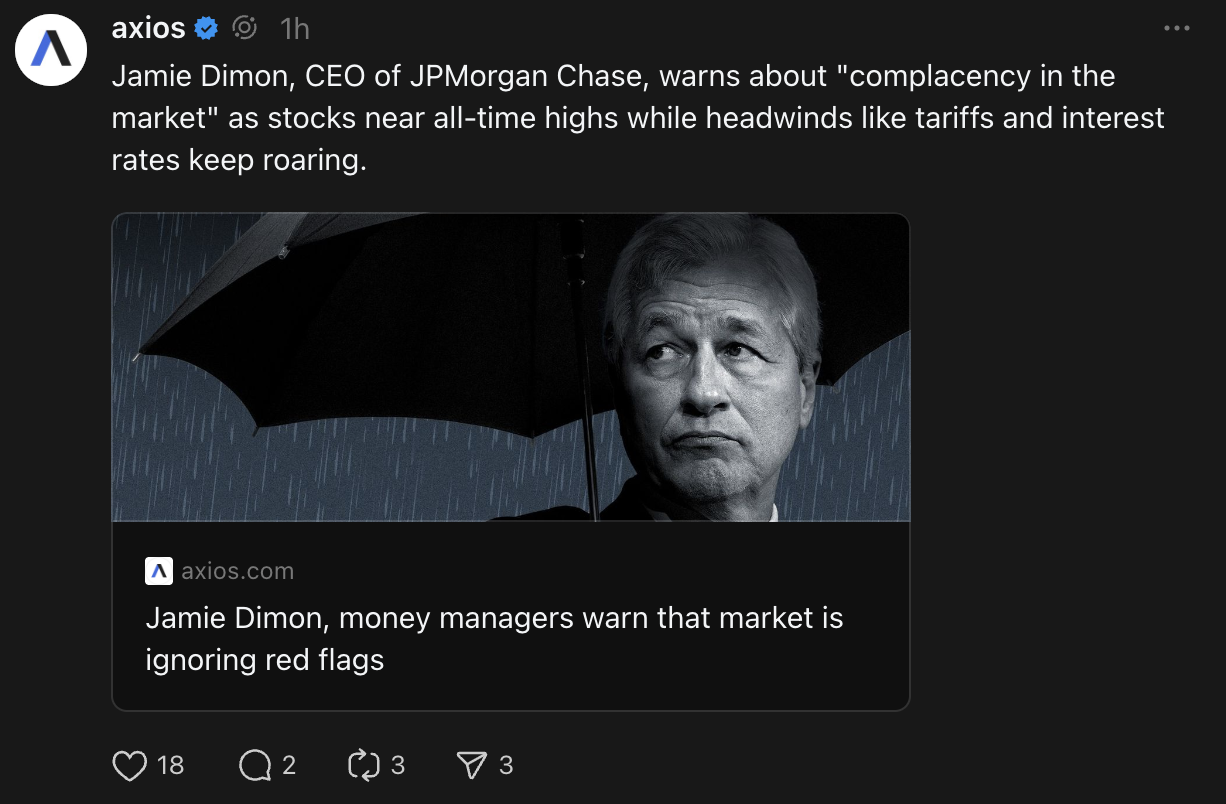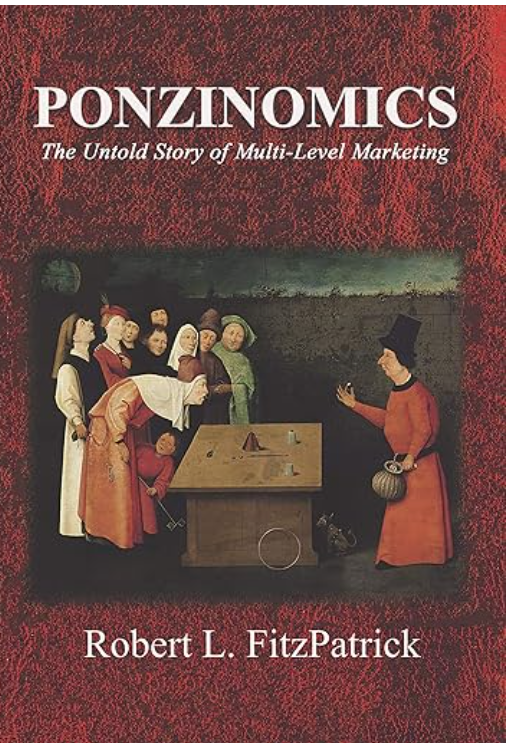I want to give a personal welcome to all the new subscribers to Herb on the Street. I hope you’re enjoying the content and will consider becoming a premium member of my Red Flag Alerts. Find out more right here. — Herb
The Weekly Wrap
▶ Since the centerpiece of what I do is called Red Flag Alerts, this Axios post caught my attention...
Actually, it was the headline: “Jamie Dimon, money managers warn that market is ignoring red flags.” To which I thought: Ya think? The knock on Jamie Dimon is that he’s often overly cautionary. I’d say he’s appropriately realistic. After all, he runs the country’s largest commercial bank – JPMorgan Chase ($JPM) – giving him a unique insight not just into the economy, but business trends.
I do confess... I have a soft spot in my heart for Dimon. We both had open heart surgery one day apart five years ago. He in New York, me in Cleveland. His was an unplanned death-defying repair of a bursting ascending aortic aneurysm, which is a one-way trip into the hospital for most people who suffer that fate. Mine was a planned replacement of my aortic valve and repair of part of my ballooning but not-yet-burst ascending aorta... the latter to minimize the chances of experiencing what Dimon did.
But regardless of whether it’s a bursting aorta, a valve replacement or even a bypass, open heart surgery can be a life-changer. Or more than that, the ordeal can be a reality check on the lottery of life, resulting in a rearrangement of priorities with heightened clarity and candor.
Dimon has never been one to hold back, but what’s clear is that now more than ever, with nothing to lose, he’s arguably speaking from the heart. I think he’s right that investors are complacent – which is always the case when stocks are spiraling higher. And investors are increasingly ambivalent about the cross-currents of geopolitical and domestic political events. Or as my friend Peter Atwater, who writes the Financial Insyghts newsletter and studies crowd behavior for contrarian signals says, "They've won so many times that they are now certain the system is rigged in their favor." Even if the risks are front-and-center.
Of course, there are those like my pal JC Parets, a technical analyst and chairman of Stock Market Media. He often says to just look at the charts instead of the headlines... because in his world view most pundits are usually wrong. Well, maybe... sometimes. And there's the old John Maynard Keynes line about the market staying irrational longer than you can stay solvent. Very true. That doesn't mean to party like it's 2021 again without forgetting what happened in 2022... when the market proved, yet again, what a great humbler it can be.
That’s why I fly red flags... I do it because in a world where most people want to only know how they can make money, few people focus on what might go wrong and how they can lose itI do it for people like subscriber Charles F., who after my series on WhatsApp stock scams, wrote, “Thank you for reminding us to be ever vigilant.”
Given that we’re now living in the Golden Age of Grift, I’d say you need to be more vigilant than ever.
▶ Speaking of the WhatsApp stock scam... I’ve been railing in my reports about how the Nasdaq can allow these companies to trade, including the most recent – “Anatomy of a WhatsApp Stock Scam.” But what about the brokerage firms that let trades in these stocks occur? And more than that... What about Meta ($META), which facilitates fake come-on ads on Facebook and Instagram... and then hosts the scamsters on WhatsApp? Well... last month a class action lawsuit was filed in the U.S. District Court’s Northern Districtgoing after Meta for its role in the scam involving China Liberal Education ($CLEU), which I mentioned in my first report. “If not for Meta’s advertising tools,” the suit says, “the CLEU scammers would not have been able to accomplish their scheme on the scale and with the efficiency they achieved.” There are some interesting first amendment issues stirred here as it applies to the Internet. Definitely worth watching. What I can say... this is not just another plaintiff’s suit.
▶ Moving on... post-mortem on Post... If you missed my report on Post Holdings ($POST), you can read a preview here. If you’re a premium Red Flag Alert's subscriber, FYI... I revised the original report to include a risk to my thesis. If you missed my report yesterday, please check your email or open the original report and scroll toward the bottom, where I added additional commentary on "risk.". Long-story short: I wrote it before Ferrero group announced it is acquiring WK Kellogg and Kraft Heinz is breaking itself up. The food industry, you might say, is in play!
▶ Finally, are meme stocks merely multi-level marketers in disguise? Not quite, but MLMs clearly offer some lessons. Or so says Robert FitzPatrick, who wrote the book, “Ponzinomics,” which is all about multi-level marketers.
I originally met Robert more than 10 years ago when I was at CNBC doing research for a documentary on Herbalife ($HLF) which was quite controversial at the time. He probably knew (and still knows) more about the dark side of MLMs than most. He reached out the other day after reading my recent comments on the market – notably when I mentioned that “I don’t know what to believe anymore” regarding some of these stocks...
Setting the Stage...
Since Robert has spent so much time on schemes and scams, what I wrote no doubt struck a chord with him.
I thought what he wrote was worth sharing. Robert started by weighing in with his comparison to MLMs, setting the stage with his definition of Ponzinomics...
A pseudo-economic, all-encompassing, delusional belief system that promotes the swindle of a Ponzi or pyramid scheme as a valid economic model that promises believers a fulfilling and financially rewarding way of life, complete with mission, values, leadership and worldview. The societal spread of Ponzinomics is necessarily accompanied by governmental collusion.
He then continued...
Tell Them What to Believe...
As you might remember, in the novel, 1984, the protagonist, Winston Smith, wondered if the authoritarian powers might declare that "2 and 2 make 5”, and that if people accepted it, would it then be “true”? The Ruling Party had already decreed that "War Is Peace, Freedom Is Slavery, and Ignorance Is Strength” to be “true.”
So, as you ask, can something with no value be overvalued? Could sheer belief and belief alone, with no other tangible asset — determine a stock’s “value"?
Multi-level marketing offers some lessons...
It is now a vast “industry,” with as many as 1,000 enterprises in the USA. Millions of people invest it in each year and 99% always lose, year in and year out.
Nevertheless, it has operated as a “legitimate business opportunity" since 1979. MLM’s “business model" is based on the declaration that the recruiting chain on which the promised “returns" are based is “endless”. It declares that wherever and whenever you buy a position on the recruiting chain, you are “at the beginning.”
So MLM's obvious lie and contradiction of objective reality is now “true," as declared by authorities. And millions of people invest in MLMs on that “truth.” Then, with millions involved, the recruiters can say, “How could it be a fraud, when millions of people are involved?”
MLM is based on "continuous collapse" – 50% or more of all participants quit within a year, after losing, but the bubble is maintained as those dropouts are replaced. The process of churning losers continues and its very continuation covers up the reality of the 99% losses.
Enter Meme Stocks...
Meme stocks and crypto attract millions of investors based on a “belief" that is based on millions having invested.
When the belief erodes, the collapse will be sudden and catastrophic, unlike MLM which is like a termite infestation that eats away at a foundation over time, sapping away savings and hopes mostly of people at the margin, not pension and hedge funds. (BTW, MLM is in significant decline in the USA, down about 25% in inflation-factored dollars since 2020. “Anti-MLM” sentiment is exploding.)
I think we all know how crypto and meme stocks will end, but who dares to say it? At a certain point – to challenge the lie that two and two make five results in cancellation, dismissal or even persecution... not just by authorities but by the believers.
That’s the place we are in right now on the meme stocks and crypto, and in other arenas too, such as national debt.
What Does ‘Meme’ Even Mean?
The word “meme” is derived from Greek, meaning “imitated thing.” The term was invented by Richard Dawkins and then it developed into various theories associated not just with cultural transmission but biological evolution.
In all those theories, I have not seen much attention to whether a meme that is a lie, a direct contradiction of objective reality – like two and two make five – can survive long term or what would be the consequences to humans.
If lies have terrible consequences, e.g., racism – and they certainly do, e.g, slavery and genocide – then truth-telling – that is, contradicting the meme – must also be part of the evolutionary process, with survival depending upon it.
Orwell defined tyranny as having to accept that two and two equal five, and he famously wrote that “Freedom is the freedom to say that two plus makes four.”
The lack of voices willing to call out MLM, meme stocks, and crypto reflect a level of tyranny.
Thanks, Robert!
DISCLAIMER: This is solely my opinion based on my observations and interpretations of events, based on published facts and filings, and should not be construed as personal investment advice. (Because it isn’t!) I do not have a position in any stock mentioned here.
Feel free to contact me at herb@herbgreenberg.com



